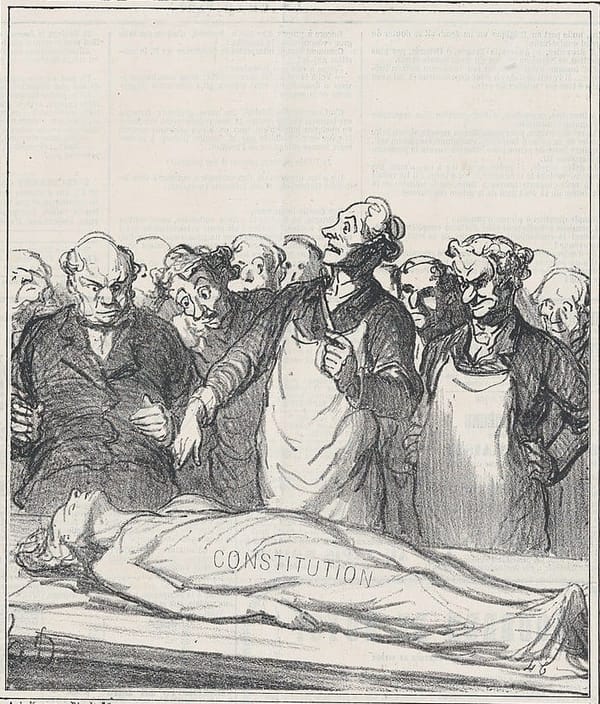The Minefield of Prejudice

One common approach for discrediting an opponent’s ideas without engaging with them on their merits is to attempt to place them in an unsavory history. Critics since Nietzsche and his On the Genealogy of Morality have been drawn to the power of this method. Recent projects in this spirit include Thomas Leonard’s Illiberal Reformers, about the ideological allegiance of the early progressive economists to the principles of eugenics, and Nancy MacLean’s Democracy in Chains, which attempts to tie the development of public choice economics to the “massive resistance” movement against desegregation. History of this kind is important, but to think that it is in itself discrediting is mistaken. We do not have a large menu of valuable frameworks on hand which lack troubling histories. Investigating the histories of frameworks is important precisely because we aren’t in a position to align ourselves with something entirely pure. It is therefore imperative that we wrestle with the potential dangers in how our ideas and other alignments prejudice us, and “genealogy” of Nietzsche’s sort can be an invaluable tool to that end.
We are not the third-person omniscient narrators of our lives. We approach everything from a perspective, an overall orientation. This orientation has many sources: our relations, culture, institutions, and the ideas we’re exposed to, to name a few. Every orientation is prejudiced. This is not categorically a bad thing. In any given situation, there are more details we could potentially pay attention to than we are in fact capable of paying attention to. Our orientation is determined precisely by what we think matters, tacitly as much as explicitly.
Of course, the fact that we need to be discriminating in our focus does not mean that all such discriminations are benign. I doubt it needs to be pointed out that a lot of our prejudices involve selectivity in what we focus on about other people, and that no small part of this involves lumping them into groups we can generalize about.
An unprejudiced orientation simply does not exist; it is a contradiction in terms. But this does not mean that we can be complacent. Acknowledging that we cannot see everywhere at once while driving a car does not stop the cars we cannot see from being potentially fatal to us—or us to them! We need to scrutinize the prejudices in our orientation, but we also need to be realistic about our ultimate goal. Contra Hegel, we cannot achieve complete illumination about our orientation, any more than we can see everywhere at once while we drive. But—at risk of overextending the metaphor—we can look extra closely at the direction we’re intending to turn, and compensate for any blind spots we’re aware of as best we can.
Scrutinizing the sources of our orientation is an important way we can learn more about our prejudices.
For example, I know that I have been heavily influenced by the philosophy of Martin Heidegger. The entire framing of this post, in terms of orientation, prejudices, and their sources, is derivative of ideas either espoused or inspired by him. There’s one rather awkward problem, however: Heidegger joined the Nazi Party, and he did so before it was mandatory. What’s worse, in 1933, he gave a speech praising the Reich using the peculiar language of his philosophy. The political involvement and the ideas cannot be cleanly separated (nor should we assume they could have been if he hadn’t invoked his philosophy in the speech in question).
As a Jew, I am rather alarmed by Heidegger’s Nazism. I can point to others who employed Heidegger’s ideas or refined them, such as his student Hans-Georg Gadamer, who were not Nazis and were horrified at Heidegger’s actions. But that is too convenient. A most influential individual in the line of thinkers to which I have substantial allegiance was a Nazi. If I am to continue to employ their frameworks, I must accept responsibility for wrestling with this fact. In particular, I must ask: Are there specific prejudices and blind spots built into the framework which allowed becoming a Nazi to seem like a reasonable choice? This is not the place to pursue such an investigation, for which there is a large literature I could not begin to do justice to. The point is, precisely because I find a Heideggerian framework so valuable, I cannot shrink from asking hard questions about what Heidegger’s Nazism implies for it.
I am also a Democrat. Among Democrats, there are people with views on Cuba I find quite troubling. This ranges from those who only ever mention Cuba in order to praise its healthcare system, to full-blown Castro apologists. As a first-generation Cuban-American, I have always found this infuriating. But does aligning myself with the party that includes such people mean that I am enabling them? Or worse, that I am developing similar blind spots towards tyrannical regimes without realizing it? It should be obvious that as a partisan, I must consider how my party impacts politics and the public conversation. Less obvious is that I should also consider, and take responsibility, for how membership in my party influences me, that is, influences my orientation.
Genealogy as scrutiny
There’s no handbook for scrutinizing the sources of one’s orientation, though a great deal of contemporary art and academic work fixates on this very subject. It is necessarily a qualitative, judgment-based endeavor. That is troubling, given it is our judgment itself which is in question! This is why it is important to get perspectives other than your own, through direct conversation but also through secondary sources. But ultimately, there’s no escaping the fact that this is a hermeneutical investigation, where objective, independent verification may be entirely elusive. This is, after all, an attempt to know and improve yourself.
Let us take another example from my own orientation: I received my M.A. in economics from George Mason University. Possibly no single individual had an influence on the development of GMU’s economics department exceeding that of James Buchanan. But MacLean, a historian at Duke University, has attracted a lot of attention this year with her book Democracy in Chains, which attempts to tie Buchanan to the racist legacy of the pro-segregation Byrd Machine in Virginia. Writer Marshall Steinbaum goes even further, claiming that Buchanan’s entire subdiscipline dehumanizes African-Americans, elaborating elsewhere that it was developed in order to “explain what happened when, for the first time in a long time, black people won the vote.”
Now, I am not especially well versed in Buchanan’s work specifically. Nor was public choice—the subfield he helped to found—something I took a class in at GMU, or have read much of since. Nevertheless, the public choice approach and Buchanan’s influence loomed large while I was at GMU. He came up frequently and small examples of how his analysis might be applied were common. I made many friends at GMU, and social media is such that my connections to it and to other alumni remain an important component of my orientation. In short, accusations of this nature are too important for me to ignore.
So I read MacLean’s book, and attempted to gauge what I could from citations for key passages. I’ve read countless criticisms and defenses of the book as well. And I’ve talked with people who have direct access to Buchanan’s archives, which have been professionally organized in the time since MacLean had access to them. Obviously, I could devote a lot more time to this question. Buchanan wrote an autobiography, and one thing lacking from MacLean and especially Steinbaum’s accounts is direct engagement with the substance of Buchanan’s works. But at this time I’m satisfied that MacLean’s evidence is thin and Steinbaum’s thinner still. For those interested, this is the best summary and this is a crucial piece of counter-evidence.
This is no grounds for complacency. Part of what made some of the accusations seem plausible is that I have noticed blind spots regarding race among some of the family of frameworks of which Buchanan’s is undeniably a part. I must continue to try and be wary of these potential blind spots in my orientation.
What’s the point of all this? In my mind, it isn’t about discrediting or defending, though defending someone’s intellectual legacy from being unjustly tarnished is a worthy activity in itself. When it comes the sources of our orientation, the challenge is that many are quite valid within a broad range of application. Elsewhere I put the matter more bluntly: For Some Values of X, Y = Genocide. The best possible framework may be terrible within certain ranges of application. One way of mapping these danger zones is to attempt to suss out what is implicit in our frameworks. But this approach is limited, and we can easily allow ourselves to articulate only a comfortable, innocuous seeming version of a framework.
It is important, therefore, to have recourse to a different method: looking at how a particular family of frameworks has gone wrong in the past. The purpose is not to determine whether or not the frameworks in question are tainted by the evils of the past. The purpose is to determine whether or not they are systematically bent towards such evils, and if so, under what circumstances.
Opposing prejudice explicitly is no grounds for complacency
Even if liberals and the left have taken on the mantle of opposing racism, sexism, and wicked prejudices of all sorts, they cannot afford to ignore the sources of their orientation. Implicit and institutional biases remain even among those who have explicitly denounced the biases in question. Perhaps no single individual was more influential on the 20th century left than Karl Marx. Putting aside the obvious problems that arose among Marxists specifically—although a small but growing group has begun once again to defend the indefensible—Marx’s antisemitism is well known. What is more, “On the Jewish Question” is considered so central to the development of his thought that it is standard to include it in collections of his writing. His criticism of capitalism is intertwined with his antisemitism in ways that any critic of capitalism employing frameworks on which he had influence ought to be concerned about. Again, this isn’t a matter of discrediting the left; if this kind of argument could accomplish such a thing, the present piece would be self-discrediting by employing Heideggerian logic while admitting Heidegger was a Nazi.
But such things must be wrestled with. So when Marshall Steinbaum and Bernard Weisberger set out to respond to Thomas Leonard’s Illiberal Reformers, I would have hoped they would address concerns of this kind. Leonard argues that eugenics was central to the orientation of the generation of progressive American economists who founded the American Economics Association. Steinbaum and Weisberger both draw heavily on those early progressive economists; indeed, they previously attempted to revive general interest in them. So surely they must either disprove Leonard’s assertions or take ownership of the troubled package they are buying into.
They do neither. In their first response to Leonard, they argue that:
[T]he exclusionary aspects of that scholarship are essentially absent from today’s progressivism. Nazism forever discredited eugenics and removed it from any progressive intellectual or political platform.
If Steinbaum and his co-author are right here, then it seems I can breathe a sigh of relief with regard to Heidegger, at least. If there’s one thing that Nazism’s defeat discredited more than anything else, it’s Nazism itself! Since the Nazi “aspect” is “essentially absent” from today’s philosophers who are influenced by Heidegger, they can stop trying to wrestle with why he became a Nazi and what it might mean for them. We’re in the clear!
No, I don’t think so. Rather, I find Steinbaum and Weisberger’s dodge quite troubling. Even more troubling is that their piece is rife with innuendo and fails to engage with any of the extensive source material that Leonard cites and quotes. Thankfully, by the time they wrote their second response to Leonard, a book review for the Journal of Economic Literature, they were willing to use the phrase “mandatory sterilization.” In their original piece they simply called it “collective action to control the birthrate.” Moreover, in their JEL review they assert that:
no eugenicist with any progressive links realized that the notion of innate inferiority could open the door to the mass murder of living populations.
A convenient argument which they provide absolutely no evidence to back. Imagine an apologist for slavery defender John C. Calhoun arguing that the man never realized arguing that African-Americans were innately inferior could lead to systematic mistreatment. Now consider the following statement from Richard T. Ely, one of the economists whose legacy Steinbaum and Weisberger appear to only take selective ownership of:
[T]here are classes in every modern community composed of those who are virtually children, and who require paternal and fostering care, the aim of which should be the highest development of which they are capable. We may instance the negroes, who are for the most part grownup children, and should be treated as such.
Steinbaum and Weisberger’s defenses of Ely boil down to listing the problems they have with Ely’s adversaries, and adding the claim that contemporary progressives have no danger of slipping into eugenics. I wish we could be so sanguine. But I think the occasional defenses of China’s one-child policy that crop up from time to time give reason to think eugenics is still very much with us, a specter looming in the background.
More to the point, if the last year has shown us anything, it is that a serious deterioration of ideas is going on amongst conservatives. We cannot allow them to be our benchmark of what is acceptable. We cannot allow ourselves to grow complacent, just because their prejudices seem clearly worse than ours. There are dangers lurking in liberal and leftist orientations that we may not be able to anticipate, if they only make themselves known in situations that haven’t played out before. We owe it to ourselves to at minimum explore the ways such orientations have gone wrong before, and take the risk of repetition seriously.
Featured image is The Formation of Man by Prometheus with the Aid of Minerva, by Louis de Silvestre




